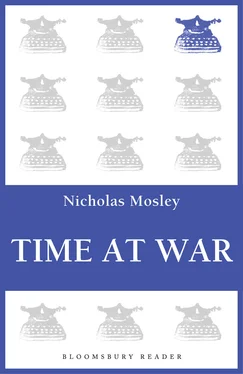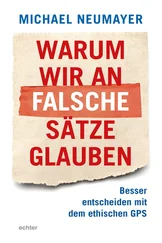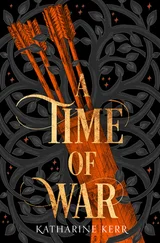Perhaps more a problem for religion. The old Greeks had gods — and so did Nietzsche, although he exclaimed that his god was dead. (I later suggested in a novel that such a god might better be seen as a successful train robber retired to the Argentine.) Anyway, not much of a task here, it is true, for logical or verifiable thinking. But then what should be the style? What about my own candidate for Good Fairy: that which goes on at the heart of matter? Here, one is told, things can both be and not be at the same time; an observer affects that which is observed; reality is a function of the experimental condition. So why should not this be the style in which one might float in the deep end of peace? A lifetime’s effort indeed! Or would one rather drown?
Humans seem at home in war; they do not feel at home in peace. This cannot be said often enough. So long as it is denied — so long as it is thought that peace is prevented by the actions of certain misfits — then humans cannot learn. There are few novels written about how to live in peace; they are held to be boring. People prefer to read about, and indeed many to experience, the senseless excitement of the simulation of war; the dicing with destruction and the risk of being dead. But if this is the condition on which evolution has depended and which has brought us to where we are, then it hardly makes sense to object — unless, that is, it is seen that evolution has also brought us to an awareness that this condition has become too dangerous and might be surmounted: one can be conscious, that is, of existence on another level.
Evolution has depended on carnage: some species have to be destroyed so that others survive. On the way, however, there have also evolved alliances, dependences, symbioses by which some species may help each other to survive, even if at the cost of others. It seems that humans have evolved an ability to be aware of this, even if they do not seem able to stop being at war within and among themselves. They see they have their animal nature; and, somewhat at odds with this, their human nature which sees the possibility of something different. But they do not seem to have evolved a strategy by which to be at ease with this — except perhaps through religion or the creation of works of art. In the course of evolution, that is, they have experienced an order beyond that of animal or even human nature — an order which seems to be outside evolution because it sees how evolution can be assessed and even reorganised. This order seems to manifest itself as infinite, eternal. Humans have called it the supernatural or spiritual; and it can naturally, of course, be said not to exist. But it seems to have arisen from a tendency of humans to try to make sense of their situation — that of being confined in an evolutionary process and yet also experiencing that a part of them is free of this, and even at times can influence it. They may attempt this by art; or perhaps try to do it by seeing their situation as funny.
Even in formal war there had seemed to be some spiritual ordering as well as orders coming down through chains of command — how else did I stay alive? You get on with things as best you can — but then what does ‘best’ involve? You keep your eyes and ears open; you learn the limitations of orders; you become aware of an ability within yourself to know what further is required. And then, when necessary, you are ready to jump in at a deep end. But I have told my story.
My last letter to my friend Timmy before he went out to Burma still hoping, perhaps, to ‘prove’ himself in war, was –
I feel that you were right in your decision to issue Burmawards. Not, however, for the reason you give. Life in battle is the most futile thing in the world, for it is the only futility about which one is forced to care desperately. And for this reason it is the most unreal thing in the world. Indeed, its most potent effect upon me was to suggest that there was no reality in anything; that all was the wild imagination of an aimless mind. I now think nothing; I am too weary to wonder about the unreality of reality; I have reached the stage where everything must be accepted or rejected without inquiry. All that I have learned of men is that they are composed of such a mixture of perfidy and nobility as I cannot hope to unravel; and all I have learned of life is that there is nothing more to be known about it save that which is observable at the end of one’s nose.
But then I had come home — to the garden of fallen angels; to the chance of a lifetime’s learning about the paradoxes of peace?
Rosemary and I married: we got away from our families for a time by going to live on a small hill farm in North Wales — me to run the farm and to write my first novel; Rosemary to paint. Writers and painters should have one foot on the earth, should they not, as well as their heads in the clouds? But then children arrived; and we had no piped water, and in winter the stream that ran past the house froze, and roads became blocked. So after a few years Rosemary’s mother suggested that for our family’s sake she should hand over to us her commodious house in Sussex, which was now too big for her, and this seemed an offer we could not refuse. This story and others that follow I have told in my autobiography Efforts at Truth.
My friend Anthony, after a year or two in the wilderness of peace, announced that he was intending to become an Anglican monk. Then a few years later my other great friend, Timmy, went to train to be a priest; and I myself was struggling to learn to be a Christian. All this was a consequence of our coming across, in turn, a holy man, Father Raynes (I have told this story more than once); but it was also, it seems to me now, of our having, in our formative years, put everything up to question even if in our fanciful style, of our having treated nothing as sacrosanct except that one should be ready, when the time seems to have come, to jump in at a deep end. We needed for a time to put our trust in orders that might seem to come from above; then, later, I at least (and this was what I became convinced Christ and Christianity were saying) believed that whatever was necessary could be known less through commands from outside than from a faculty for being aware of an ordering that grew within oneself.
About my relationship with my father — I stayed on good terms with him so long as he remained a gentleman farmer. But by 1948 he was being enticed back into politics and I did not see so much of him; and anyway, Rosemary and I had married and were escaping to North Wales. Then, at the end of the 1950s he was standing as a parliamentary candidate for North Kensington, hoping apparently to attract the anti-black vote, and I became determined to have a decisively antagonistic confrontation with him. I managed this; and in the course of it he said he would never speak to me again. This situation lasted for several years. Then at the end of his life when he had Parkinson’s disease and was finally out of politics, I became close to him again. He was, as he had been in prison, resigned and benign, and trying to look back on what had gone wrong in his life and what might have gone right. We talked in our old freewheeling style; and just a week before he died he announced that he wished me to have all his papers so that I could write his story. He knew how much I had disapproved of his politics; he also knew I would try to tell the truth as I saw it because that had been our style.
About my loves — my marriages to my first wife Rosemary and to my second wife Verity — I have tried to tell of these in my novels. The style is one which tries to portray the hope of peace but the near impossibility of achieving it: a condition in which there seem to be no orders but only paradoxical demands for self-ordering. Love has to be self-giving yet you have to make of yourself something to give; marriage should purvey not only possession but enablement. This is what seems impossible; but also what, if admitted, seems possible through grace. Peace can be found in the mind and in the heart. War, evolution, can go on elsewhere.
Читать дальше












